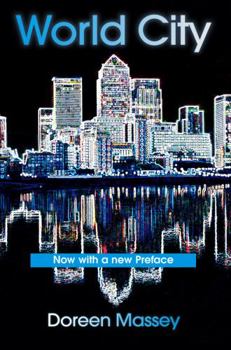World City
Cities around the world are striving to be global. This book tells the story of one of them, and in so doing raises questions which are essential for all cities. These questions concern identity, place, and political responsibility in the changing geographies of our times. The book also tells the story of the rise of a new class, of deepening inequality, and of the geographical imaginations that are mobilised to legitimate the increasing dominance...
Format:Paperback
Language:English
ISBN:0745640605
ISBN13:9780745640600
Release Date:September 2007
Publisher:Polity Press
Length:272 Pages
Weight:1.65 lbs.
Dimensions:0.8" x 5.6" x 8.3"
Customer Reviews
1 rating
Brilliant study of Britain's capital city
Published by Thriftbooks.com User , 16 years ago
Doreen Massey, Professor of Geography at the Open University, has written a brilliant study of London. It is a city of workers, and still of manufacturing industry, claimed by a minority for finance capital. London's economy is still closely tied into Britain's economy. London's main export market is not abroad, but the rest of Britain: 28.5% of all London's exports go to the rest of Britain, 12.33% go abroad; 39.88% of financial services go to the rest of Britain, 31.46% abroad; and 32.89% of business services go to the rest of Britain, just 12.08% abroad. Yet the City of London is a key base of class power, of command and control, where finance capital rules. The City's dominance was a class victory for Thatcherism, and has led to growing exploitation and so to growing inequality and poverty both here and abroad. As Massey writes, `a new imperial order has taken hold'. The Labour government embraced the Thatcher counter-revolution and spread it to the regions, trying to incorporate the whole of Britain into Thatcherism, by urging the regions to embrace finance, destroy industry and compete to attract capital and labour. So the Treasury blames regional inequality on regions' `market failures', not on the failure of the whole market model. Finance capital demands the free movement of capital and labour. So in 2004, the London Chamber of Commerce and Industry welcomed the increased immigration into London from the new EU members. Later, governor of the Bank of England Mervyn King admitted, "Without this influx to fill the skills gap in a tight labour market it is likely that earnings would have risen at a faster rate." Massey too notes immigration's `depressive effect on wages at the lower end'. She also points out that commitment to immigration conflicts with commitment to equality between nations, writing, "Unrestricted immigration can result in increased inequality between countries." Immigrant workers, for instance nurses from Ghana, are subsidising London, `a perverse subsidy, flowing from poor to rich'. Voices from the South, including Nelson Mandela, have called for these flows of labour to be constrained or stopped. `London-as-global-city' is hospitable both to immigration and to finance capital. But London as Britain's capital city needs neither immigration nor finance capital; it needs to be first and foremost a city for Britain.





